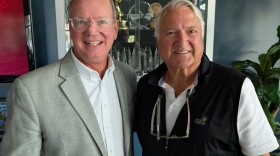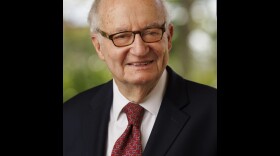
Gulf Coast Life
Monday through Thursday at 2 & 7PM
Gulf Coast Life is a locally produced talk show that strives to connect listeners to the people, places, and things that make Southwest Florida unique.
Produced & Hosted by: Mike Kiniry
Contributing Hosts: John Davis, Cary Barbor, and Emma Rodriguez
Facebook: WGCU Public Media
Twitter: twitter.com/wgcu - #GCL
Latest Episodes
-
The name Ed Carlson is synonymous with the Audubon Corkscrew Swamp Sanctuary and he could rightfully be described as a legendary figure in the Southwest Florida environmental community. He passed away on Dec. 9 at the age of 75. Carlson’s stewardship of the sanctuary began when he stumbled into an internship right as he was graduating from high school in Miami in the late 1960s. He studied zoology and ornithology in college at University of South Florida with an eye on working with the land and water and wildlife. When Audubon received a grant to study wetlands from the National Science Foundation - right as he graduated from USF - it led him back to the sanctuary and he never left. We remember him through a conversation recorded in 2019.
-
WGCU’s Documentary unit produced a film earlier this year called Rising: Surviving the Surge. It’s a gripping exploration of Hurricane Ian’s impact and what followed as survivors worked to rise from the wreckage. It includes dramatic storm footage, powerful stories of resilience, and insights from scientists, first responders, and community leaders. On Nov. 13 we screened the film at Florida Gulf Coast University’s Water School and brought together a panel of experts from the university who had different areas of expertise to get their take on the film and have a conversation about what Ian showed us, and whether we could learn any lessons and even put them into action going forward to make Southwest Florida more resilient in the face of major hurricanes.
-
An encore presentation of Gulf Coast Life featuring Ed Carlson, the long-time warden of Audubon's Corkscrew Swamp Sanctuary (he retired in 2012). Carlson died on Dec. 9.
-
The Audubon Society’s Christmas Bird Count began on Christmas Day in the year 1900. During the annual count, birdwatchers walk around designated circular areas and count the type, and number of birds they see and hear over the course of the day. The information they collect is used to track bird populations in North and South America, and how they have changed over time. The Corkscrew Swamp Sanctuary’s Christmas Bird Count covers the sanctuary and its surroundings. This year it’s happening this coming Saturday, Dec. 20 and we talk with the Sanctuary's director to learn more.
-
We talk with a psychologist as well as a Bonita Springs student about how adolescents with diverse learning styles can thrive.
-
According to local health professionals, older adults are increasingly vulnerable to addiction and co-occurring mental health issues — especially in recent years. Substance abuse — most commonly alcohol but also prescription drugs like opioids — doesn't necessarily indicate a mental health condition, but they can often be connected. To get a sense of what lies behind the increase and what treatment options are out there, and what families and caregivers should watch for and how they can support loved ones in seeking help, we talk with someone from the Hazelden Betty Ford Clinic in Naples.
-
Florida Gulf Coast University’s 2025-26 Provost’s Seminar Series kicked off last Friday with renowned infectious disease expert, Dr. Michael Osterholm. He is considered to be one of the nation's foremost experts in infectious diseases – and has dedicated his career to advancing global efforts to prepare and respond to emerging infectious disease threats. We normally interview speakers for the Provost’s Seminar Series in-studio while they’re on campus to talk, but we’re kicking off this year with a special on-location recording of a conversation with Dr. Osterholm, and Dr. Steve Mason, he’s a cardiologist and a member of the Naples Discussion Group’s Executive Committee.
-
Canadian philosopher Marshall McLuhan is most recognized for the expression "the medium is the message" which means the technology or medium we use to transmit information changes our behavior — and society — more than the information it carries. Tim Love spent more than four decades in the world of global advertising. He was Vice-Chairman of the global advertising and marketing services company, Omnicom Group. Since retiring, Love has turned his attention toward the way our online world operates today — and how behavior data collected on us users is being used to not only drive our behavior but is negatively impacting mental health and has led to polarization. We discuss his new book "The Medium is the Mirror: The Reformation of Truth."
-
This year marks the 60th anniversary of a landmark document called Nostra Aetate (translates as In Our Time) which was the result of Jewish and Catholic collaboration during the Second Vatican Council that ran from 1962 to 1965. It fundamentally changed the official Roman Catholic position on Judaism and spoke out openly against antisemitism. Now, 60 years later, the Catholic-Jewish Dialogue of Collier County along with the Jewish Community Relations Council of Greater Naples and Ave Maria University are presenting a two-day symposium bringing together a panel of distinguished theologians and professors from across North America to discuss the landmark document that changed 20 centuries of Catholic-Jewish relations – and it’s importance in our time.
-
The American College of Sports Medicinehas issues a worldwide fitness trend forecast report each year. On this episode, we discuss what is popular now.










